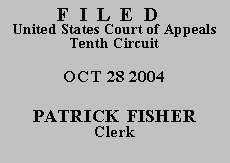

| JAMES PATRICK BOLTON, |
|
| v. | |
| LARRY REED, Warden; ATTORNEY GENERAL OF THE STATE OF COLORADO, |
(D.C. No. 03-B-172 (PAC) ) |
Mr. Bolton's § 2254 petition arises out of his 1990 Colorado conviction on two counts of sexual assault and resulting forty year sentence. The Colorado Court of Appeals affirmed Mr. Bolton's convictions and sentence on direct appeal, and the Colorado Supreme Court denied his petition for a writ of certiorari. Subsequently, Mr. Bolton filed post-conviction motions in the Colorado trial court. The trial court denied his motions, and the Colorado Court of Appeals affirmed those rulings. The Colorado Supreme Court then denied Mr. Bolton's petition for a writ of certiorari in the post-conviction proceedings.
In the instant § 2254 action, Mr. Bolton raised the following claims: (1) his trial counsel provided ineffective assistance of counsel in violation of the Sixth Amendment by failing to advise him whether he should testify; (2) his counsel on direct appeal provided ineffective assistance by failing to raise certain issues; (3) his counsel in the state post-conviction proceedings also provided ineffective assistance; (4) he was deprived of his rights to due process, equal protection, and confrontation because a prosecution witness committed perjury and because trial transcripts were altered to conceal that perjury; (5) hearsay testimony deprived him of those same rights; (6) prosecutorial and judicial misconduct in allowing perjury and the alteration of transcripts violated his due process, equal protection, and confrontation rights; (7) the victim's mistaken identification violated those same rights; (8) the trial court violated his due process rights by applying an aggravating factor to enhance his sentence; and (9) the trial court's cumulative errors violated his rights to due process, equal protection, confrontation, and to be free from cruel and unusual punishment.
The magistrate judge concluded that Mr. Bolton's third claim--that he received ineffective assistance of counsel in the post-conviction proceedings--did not allege a violation of federal law and was thus not cognizable in a § 2254 proceeding. See Rec. doc. 21, at 4 (Recommendation, filed Jan. 30, 2004). As to Mr. Bolton's remaining claims, the magistrate judge concluded that Mr. Bolton had failed to exhaust them in the Colorado courts and that they were now procedurally barred. The magistrate judge further concluded that Mr. Bolton had failed to demonstrate either cause and prejudice or a fundamental miscarriage of justice excusing the procedural bar. Upon de novo review, the district court adopted the magistrate judge's recommendation and dismissed Mr. Bolton's petition.
In order to appeal the district court's denial of his § 2254 petition, Mr. Bolton must obtain a COA by making "a substantial showing of the denial of a constitutional right." 28 U.S.C. § 2253(c)(2). Mr. Bolton may make this showing by demonstrating that "'reasonable jurists would find the district court's assessment of the constitutional claims debatable or wrong.'" Miller-El v. Cockrell, 537 U.S. 322, 338 (2003) (quoting Slack v. McDaniel, 529 U.S. 473, 484 (2000)). "[A] claim can be debatable even though every jurist of reason might agree, after the COA has been granted and the case has received full consideration, that [the] petitioner will not prevail." Id. Moreover, because he seeks to proceed IFP in this appeal, Mr. Bolton must also demonstrate a financial inability to pay the required fees and "a reasoned, nonfrivolous argument on the law and facts in support of the issues raised." McIntosh v. United States Parole Comm'n, 115 F.3d 809, 812 (10th Cir. 1997) (internal quotation marks omitted)..
For substantially the same reasons set forth by the magistrate judge, we conclude that Mr. Bolton is not entitled to a COA and is not entitled to proceed IFP. The magistrate judge's recommendation reflects a careful analysis of the record and is supported by the applicable law. Mr. Bolton's appellate brief argues the merits of his claims but does not present a colorable argument undermining the magistrate judge's conclusion that the majority of his claims were unexhausted and procedurally barred and that his claim for ineffective assistance of post-conviction counsel is not cognizable in a § 2254 proceeding. Although Mr. Bolton again alleges that many of his claims were not exhausted because of his post-conviction counsel's deficiencies, the ineffective assistance of counsel in post-conviction proceedings does not constitute cause by which a § 2254 petitioner may avoid procedural bar. See Demarest v. Price, 130 F.3d 922, 941 (10th Cir. 1997).
For substantially the same reasons set forth in the magistrate's recommendation we DENY Mr. Bolton's application for a COA, DENY Mr. Bolton's motion to proceed IFP, and DISMISS this appeal.(*)
Entered for the Court,
Robert H. Henry
Circuit Judge
*. We also deny Mr. Bolton's motion for appointment of counsel.